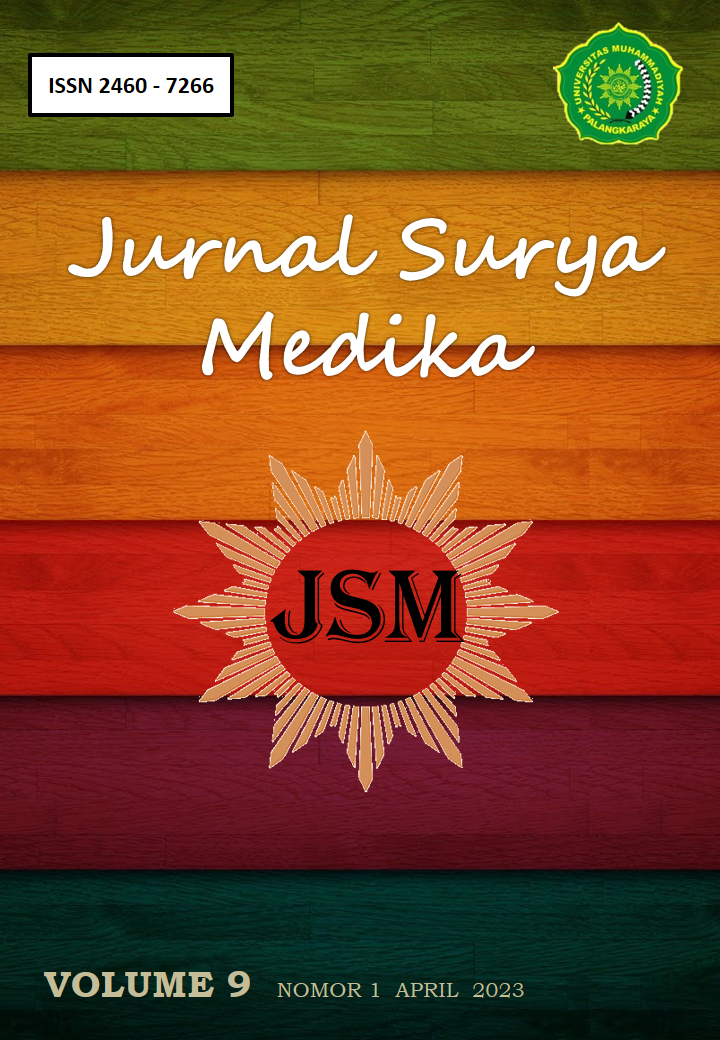Pengaruh Promosi Kesehatan Tentang Perilaku Hidup Bersih dan Sehat(PHBS) Rumah Tangga Terhadap Tingkat Pengetahuan Masyarakat di Wilayah Puskesmas Kereng Bangkirai Palangka Raya The Effect of Health Promotion on Clean and Healthy Living Behavior in the Household on Community Knowledge Level Kereng Bangkirai Community Health Center
Main Article Content
Abstract
The application of clean and healthy living behavior, especially in terms of smoking in the house and rarely eating fruit and vegetables in the community is still low. One of the efforts that can be done is by conducting health promotion regarding PHBS. Annual Report of the Kereng Bangkirai Health Center in 2020 in the health promotion program the achievement of PHBS households on the indicators of eating fruit and vegetables with an achievement of 65.33% and not smoking in the house with an achievement of 49.74%, deliveries assisted by health workers at health facilities 92.68%, exclusive breastfeeding 73.33% , weighing children under five every month 73.26%, clean water facilities 100%, CTPS with running water 98%, healthy latrines 98.67%, larvae eradication with PSN 91.33% and physical activity 90%. Knowing the effect of health promotion on PHBS households on community knowledge. The design of this study uses a Pre Experiment with a One Group Pretest-Post test Design approach. The population in this study were all residents of Kereng Bangkirai Health Center with a total sample of 95 respondents. The sampling method used is purposive sampling. The data of this study were taken using a questionnaire twice, namely before health promotion and after health promotion. After tabulating the existing data, it was analyzed using the Paired T Test. The results showed that there was an increase in knowledge from before and after health promotion on community knowledge at Kereng Bangkirai Health Center, Palangka Raya. That it can improving clean and healthy living behavior in household settings and can re-intervention which aims to further improve hygiene in order to avoid various diseases.
Downloads
Article Details

This work is licensed under a Creative Commons Attribution-ShareAlike 4.0 International License.
All rights reserved. This publication may be reproduced, stored in a retrieval system, or transmitted in any form or by any means, electronic, mechanical, photocopying, recording.
References
Budiman dan Riyanto, 2013, Kapita Selekta Kuesioner : Pengetahuan dan Sikap dalam Penelitian Kesehatan,Penerbit Salemba Medika, Jakarta, pp. 11-22. Fakl Farmasi; Skripsi.
Fajaruddin. 2019. Perilaku Hidup Bersih Dan Sehat (Phbs) Pada Tatanan Rumah Tangga Masyarakat Desa Parang Baddo Clean and Healthy Life Behavior at Household on Parang Baddo Village. In Jurnal Nasional Ilmu Kesehatan.
Gaol, H. R, L., Ginting, D., Manurung, K., Nababan, D., Manurung, J. 2021. Strategi Promosi Kesehatan Terhadap Perubahan Pengetahuan Perilaku Hidup Bersih Dan Sehat (Phbs) Pada Tatanan Rumah Tangga Di Desa Parsingguran 1 Kecamatan Pollung Tahun 2021. Journal Of Healthcare Technology And Medicine, 7(2).
Kemenkes RI. 2018. Hasil Pemantauan Status Gizi. Buku Saku Pemantauan Status Gizi Tahun 2017.
Kementrian Kesehatan Republik Indonesia. 2018. Kemenkes RI. Profil Kesehatan Indonesia 2017. Data dan Informasi. Kementrian Keseahtan RI; 2018. In Jurnal Ilmu Kesehatan.
Notoatmodjo. 2012a. Metodologi Penelitian Kesehatan. Rineka Cipta.
Notoatmodjo. 2012b. Promosi Kesehatan dan Perilaku Kesehatan. Jakarta: PT Rineka Cipta.
